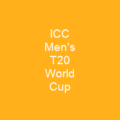The ICC Champions Trophy: A Journey Through Cricket’s Glory
Imagine a tournament where the world’s best One Day International (ODI) teams come together, not just to compete but also to raise funds for cricket in developing nations. That’s what the ICC Champions Trophy is all about! First launched as the ICC KnockOut Trophy in 1998, it has since evolved into a prestigious event that captures the essence of international cricket.
A Brief History and Evolution
The tournament’s journey is marked by significant changes. From its inception to the current format, the Champions Trophy has seen numerous transformations. It was renamed in 2014, and now it stands as a symbol of international cricket’s spirit. The Champions Trophy is held every four years, with the qualification phase preceding the tournament itself.
Notable Hosts and Winners
The ICC Champions Trophy has been hosted by several countries, each bringing its unique flavor to the event. Sri Lanka was the first host to win in 2002, sharing the title with India due to rain interruptions. England has hosted it three times, reaching the final twice but losing both times (in 2004 and 2013). The tournament’s most successful team is India, which has won three titles.
The 2025 Edition: A Revival
In a significant move, the 2025 edition of the Champions Trophy was hosted across Pakistan and Dubai due to security concerns. This revival after several years of inactivity marks a new chapter for the tournament. The ICC has also introduced a new visual identity and logo, ensuring that the event remains relevant and exciting.
Future Hosts
The future looks bright for the Champions Trophy. In November 2021, it was announced that the 2029 edition would be held in India, with expectations set high for this grand event. The tournament’s format and rules have also evolved over time, making each edition unique.
Qualification and Format
The qualification process has changed significantly since its inception. From 1998 to 2009, the number of teams was reduced to eight. Since then, the top eight teams from the ICC Men’s Cricket World Cup secure a berth for the event. The tournament typically lasts around two and a half weeks, with 8 teams participating.
Changes in Competition Format
The competition format has also seen changes over time. Initially, it was straight knockouts but later shifted to round-robin tournaments. This change ensures more balanced matches and better opportunities for all teams to showcase their skills.
National Performances
Several nations have made significant impacts in the Champions Trophy. England has reached the final twice, while Bangladesh reached the semi-finals in 2017. Zimbabwe never got past the first round as a host team. The results show that 13 nations have qualified for the Champions Trophy at least once, with seven teams competing in every finals tournament.
Notable Matches
The 2006 ICC Champions Trophy saw Australia beat West Indies by 8 wickets to win their first title. In 2009, the final was between Australia and New Zealand, with Australia winning by 6 wickets. The 2013 final witnessed India defeating England by 5 runs, securing their second title.
Recent Developments
The 2017 ICC Champions Trophy in England saw Pakistan win comfortably against defending champions India by 180 runs. This match was a thrilling spectacle of cricket, with West Indies’ return after a nine-year absence adding to the excitement.
Conclusion
The ICC Champions Trophy is more than just a tournament; it’s a celebration of international cricket. From its humble beginnings as the ICC KnockOut Trophy to its current status as one of the most anticipated events in ODI cricket, the Champions Trophy continues to evolve and captivate fans worldwide. As we look forward to future editions, one thing remains clear: this tournament will always hold a special place in the hearts of cricket lovers.

You want to know more about ICC Champions Trophy?
This page is based on the article ICC Champions Trophy published in Wikipedia (retrieved on March 15, 2025) and was automatically summarized using artificial intelligence.







